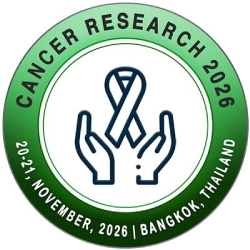Track: Cancer Cell Biology & Genetics

The COVID-19 pandemic has had a
significant impact on cancer cell biology and genetics research, introducing
new challenges and shifting research priorities. Disruptions in laboratory
operations and reduced access to resources affected the progression of studies
focused on understanding the molecular mechanisms of cancer. These
interruptions have delayed the identification of new genetic markers and
hindered the development of targeted therapies, impacting the overall pace of
progress in cancer genomics.
Genetic Mutations and Cancer:
Explore the role of genetic
mutations in cancer development, progression, and treatment resistance. Genetic
Mutations and Cancer sub-session will cover the latest research on tumor
genetics, key mutations linked to different cancer types, and how understanding
these changes aids personalized treatment strategies.
Cell Cycle Dysregulation:
Understand how cell cycle
dysregulation contributes to cancer development and progression. This sub-session
will cover the molecular mechanisms behind cell cycle checkpoints, key
regulatory proteins, and their role in tumor growth, as well as potential
therapeutic targets for cancer treatment.
Apoptosis and Resistance to
Cell Death:
Explore the intricate mechanisms
of apoptosis, the programmed cell death essential for cellular homeostasis, and
delve into how resistance to this process fuels cancer progression, shaping
therapeutic challenges and innovative treatment strategies.
Tumor Microenvironment:
Delve into the complex
interactions within the tumor microenvironment and their impact on cancer
progression and treatment response. Tumor Microenvironment sub-session
will explore key components such as immune cells, stromal elements, and
signaling pathways, highlighting therapeutic approaches to target this
environment.
Cancer Stem Cells:
Examine the role of cancer stem cells in tumor initiation,
progression, and resistance to treatment. This sub-session will cover their
unique properties, signaling pathways, and potential therapeutic strategies
aimed at targeting these cells to improve treatment efficacy and prevent
relapse.
Scientific Highlights
- Oncogenesis
- Gynecologic cancer
- Covid and Its Impact on Cancer
- Cancer Cell Biology & Genetics
- Cancer Imaging Techniques
- Diagnosis and Treatment of Cancer
- Breast Cancer
- Head and Neck Cancer
- Pediatric Cancer
- Oncology Nursing and Care
- Advances In Cancer Research And Treatment
- Neuro-Oncology
- Cardio-Oncology


